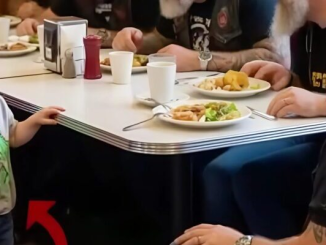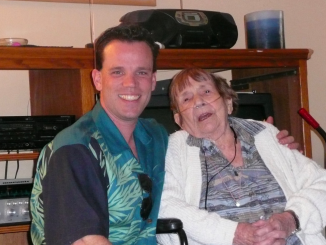
Most parents knew her as “Miss Tessa from lunch.” Hair always tied back, warm smile, handing out cartons of milk and calling every kid “sweetheart.” She wasn’t a teacher. She didn’t run the PTA. She was just there—every day, quiet and steady.
But something shifted the day she posted a photo of a crumpled piece of notebook paper on the school bulletin board.
It was written in purple crayon, barely spelled right. Just five words:
“You make me feel safe.”
No name, no class info—just those words and a tiny heart scribbled underneath.
She found it tucked under her tray cart after lunch. At first, she thought it was meant for a teacher, maybe dropped by mistake. But when she asked around, no one claimed it.
That night, she taped it above her stove. Said it reminded her why she stayed in that job, even when the pay barely covered gas.
But what happened next—what no one expected—was that it changed the entire school.
A few days after she pinned up the photo of that note, a second note appeared.
This time, it wasn’t written by a child. It was a sticky note, slapped right below the original. Neat handwriting. It read:
“Miss Tessa, you make my daughter feel safe too. Thank you for being a calm place in a noisy world.”
No signature. But Tessa cried in the supply closet for ten minutes.
She never expected that kind of recognition. She wasn’t one for attention. She always said she liked being “the wallpaper,” just part of the background that made everything else feel normal.
But the notes kept coming.
By the end of the week, the board next to the cafeteria was covered. Parents, students, even teachers started writing little messages, all about the small ways Miss Tessa had made them feel noticed. Or loved. Or just… not alone.
“You smiled at me when I had a bad morning.”
“You remembered my allergy when no one else did.”
“You said my art looked cool, and it made me want to keep drawing.”
The principal eventually gave her the bulletin board permanently. She called it “Tessa’s Wall.” And it became something of a legend in the school.
But the real story didn’t begin until one rainy afternoon in November.
It was a Thursday. Tessa remembered because she always served chicken nuggets on Thursdays, and that particular day, she ran out before the third-grade lunch period even started. Kids were upset. A few cried. She apologized, offered extra fruit cups, tried to smile through it.
After the lunch rush, as she wiped down the long tables, she noticed a boy sitting alone in the corner. Tiny. Curly brown hair. He wasn’t eating—just staring at his tray.
She walked over, sat on the bench across from him.
“You didn’t eat your pizza, sweetheart.”
The boy didn’t look up. He mumbled, “It’s not my favorite.”
Tessa tilted her head. “What is your favorite, then?”
He finally looked up. “Nuggets.”
She smiled softly. “I thought so.”
There was a long pause. Then he said, quietly, “Mom says we might have to move again.”
And just like that, she understood.
It wasn’t about the nuggets.
Miss Tessa reached into her pocket and pulled out a granola bar. She handed it to him without saying a word.
The boy took it like it was a gift from heaven. He didn’t say thank you. He didn’t need to.
The next morning, she found another note tucked under her tray cart.
“You’re the only nice grown-up today. I don’t want to move. –L”
She didn’t post that one.
She kept it.
Tucked it into her wallet next to a picture of her daughter who had passed away fifteen years earlier.
Tessa had never told anyone at school about her daughter. It wasn’t the kind of thing she brought up. But something about that little boy cracked open something old and sore in her chest.
She started watching for him. His name, she learned, was Luis.
He was in kindergarten, and his mother worked nights. Sometimes, he came to school with his shirt inside-out. Sometimes, he wore mismatched shoes. But he was always polite, always quiet.
And always, a little sad.
Tessa began packing an extra sandwich each day. She’d leave it near the cart, pretending she forgot it, and Luis would always “find” it. It became their silent ritual.
She thought she was just being kind. Filling in a gap. Nothing special.
But then, in February, everything changed.
Luis didn’t show up for school. Not that day. Not the next. Not the next week.
Tessa asked his teacher. The front office. No one knew. His phone numbers were disconnected. They assumed the family had moved.
She didn’t.
She checked the news. Searched shelters. Nothing.
And just like that, he was gone.
The loss hit her harder than she expected. She didn’t even realize how attached she’d become until she cried herself to sleep for three nights straight.
Then one Saturday, while walking home from the market, she saw him.
Sitting outside a gas station, huddled under a soaked blanket, was Luis—with his mother and baby sister.
She dropped her grocery bag. Ran to them.
His mother looked embarrassed. Defensive. Tired.
Tessa knelt down. “Do you need help?”
She didn’t say yes.
But she didn’t say no, either.
That night, Tessa gave them her couch, her extra blankets, and the last of her chicken soup.
She only had a one-bedroom apartment. No savings. But she couldn’t sleep knowing they were out there.
For three weeks, they stayed with her. Luis started smiling again. His mother found a job cleaning offices at night. Tessa helped with school paperwork and even called in a few favors to get them an apartment with reduced rent.
She never told anyone at school. Not the principal. Not the staff. She said it wasn’t about looking good. It was just what you do.
But the truth has a funny way of surfacing.
It was Luis who told his class during “share time.” He said, “I used to be scared of sleeping outside, but then Miss Tessa gave us her house and her soup.”
The teacher blinked.
By the end of the day, the entire school knew.
By the end of the week, a group of parents started a fundraiser for Miss Tessa.
She didn’t want to accept it. Said she didn’t need money to be kind.
But then the local paper picked up the story. Then a morning news show. Then a feature in a national magazine about “unsung heroes.”
Tessa became a quiet celebrity. People from other states mailed her thank-you letters. Someone sent a quilt with the words “You Make Me Feel Safe” stitched in the middle.
She kept working in the cafeteria. Refused to retire, even when someone offered to pay her living expenses for a year.
“Kids still need lunch,” she said.
But the real twist came the following spring.
One of the parents who had donated to the fundraiser was a man named Miles.
He wasn’t flashy. Wore old jeans and always picked up his daughter five minutes late.
But he watched everything.
Turned out, he was the CEO of a medium-sized tech company—quiet, local, but growing.
He came to Tessa one day with an envelope.
She thought it was a thank-you card.
It was a job offer.
Not in tech. Not behind a computer.
He wanted her to be the head of a new foundation he was starting—a nonprofit focused on helping underprivileged families find housing, food, and emergency support.
He called it “The Safe Place Project.”
Tessa stared at him like he’d grown two heads. “I’m just a lunch lady.”
He smiled. “You’re the reason the idea exists.”
She turned him down twice.
Said she didn’t belong behind a desk.
But he was patient. Explained that it wouldn’t be a desk job. It would be community work. Hands-on. Visiting schools. Talking to families. Distributing food. Partnering with shelters.
He told her, “We can hire a hundred social workers, but we can’t hire heart. You have heart, Miss Tessa.”
Eventually, she agreed.
With one condition: she’d still work in the cafeteria two days a week.
So that’s what she did.
Every Monday and Thursday, she still handed out milk cartons and called every kid “sweetheart.”
The rest of the week, she built something bigger than herself.
Within two years, the Safe Place Project had helped over 300 families with temporary housing. They started a program that delivered weekly food boxes to students during summer break. Another program helped single parents apply for childcare subsidies.
And every single initiative was branded with the same five words from that note in purple crayon.
“You Make Me Feel Safe.”
Tessa never found out who wrote it.
But she said that maybe it didn’t matter.
Maybe it wasn’t just from one kid.
Maybe it was from all of them.
From every child who ever felt alone and needed someone to see them.
From every adult who thought kindness had to be earned.
And from every one of us who forgets how much a quiet smile or a granola bar can mean.
The twist was never about her becoming famous. Or starting a nonprofit.
The real twist was that she never thought she mattered.
And it turned out—she was the heart of an entire community.
And the message?
You don’t have to be someone important to change the world.
Sometimes, just showing up every day with kindness is enough.
So smile at someone today. Give what you can. And never underestimate the power of being steady, quiet, and good.
You never know whose life you’re holding together without even realizing it.
If this story touched your heart, share it. Like it. Pass it on.
Because kindness deserves to echo.






Leave a Reply